

Pilgrims perform Hajj during Dhul Hijjah every year, which is one of the most sacred months in the Islamic Calendar.
Hajj begins on the 8th of Dhul Hijjah, continuing for six days in which Muslims perform various rituals, such as hitting the Jamarats with stones, and ends on the 13th of Dhul Hijjah.
One of the after-Hajj rules set by Saudi Arabia is that all pilgrims must leave the country by the 10th of Muharram.
Hajj is a deeply spiritual and transformative journey, and its effects continue long after the pilgrims return home to their daily lives. The essence of this journey lies in standing before the Kaaba, circumambulating it, praying at different holy sites, and retracing the steps of Prophet Muhammad (PBUH) that he established in 632 CE.
Performing Hajj is a deed unlike another, It not only replenishes the soul but gives Muslims a new life so they can change their bad habits and become better.
From Abu Hurairah, the Messenger of Allah (peace and blessings of Allah be upon him) was asked which deed is best.
He said, “Belief in Allah and His Messenger.”
He was asked, then what?
He said, “Jihaad for the sake of Allah.”
He was asked, then what? He said, “An accepted Hajj.”
Al-Bukhari, 26; Muslim, 83
The spiritual effects of the Hajj start long before the pilgrim reaches Mecca. When people travel to sacred places in Hajj, they leave behind their wives, children, friends, and homeland – similar is the journey to the hereafter.
Hajj reminds us of the vital lessons that Allah has instructed us to follow and live by. Here are five spiritual messages this journey teaches us:
All Humans Are Equal
يَـٰٓأَيُّهَا ٱلنَّاسُ إِنَّا خَلَقْنَـٰكُم مِّن ذَكَرٍۢ وَأُنثَىٰ وَجَعَلْنَـٰكُمْ شُعُوبًۭا وَقَبَآئِلَ لِتَعَارَفُوٓا۟ ۚ إِنَّ أَكْرَمَكُمْ عِندَ ٱللَّهِ أَتْقَىٰكُمْ ۚ إِنَّ ٱللَّهَ عَلِيمٌ خَبِيرٌۭ
“O humanity! Indeed, We created you from a male and a female and made you into peoples and tribes so that you may ‘get to’ know one another. Surely, the most noble of you in the sight of Allah is the most righteous among you. Allah is truly All-Knowing, All-Aware.”
Young or old, poor or rich – millions of Muslims from all walks of life make the journey to Saudi Arabia to unite for this holy pilgrimage. In the eyes of Allah, we all are equals.
In fact, Prophet Muhammad (SAW) addressed a large crowd one last time in Makkah, reminding them not to discriminate against people based on nationality, skin, race, and color. What distinguishes us is taqwa – our fear of Allah.
Complete Submission
When Muslims hit the Jamarats with pebbles, they denounce Satan and follow the sunnah of Prophet Muhammad (SAW) and Isma’il (AS). This is a action that a pilgrims follow in accordance with the teachings of Sunnah and obey Allah (SWT) unquestioningly.
Self-Reflection and Repentance
Hajj offers a unique opportunity for Muslims to seek forgiveness for their sins. When one performs Umrah, their sins are expiated, but with Hajj, they are erased.
This is why pilgrims should make amends before going on their journey and commit to a life of righteousness. The rituals, the prayers, and the atmosphere of devotion create an environment conducive to deep introspection, allowing you to atone for all your wrongs.
A Profound Sense of Humility
“For indeed, with hardship [will be] ease.”
Holy Quran, 94:5-6
The heat, the large crows, the fear of being trampled if you trip, and the physically demanding rituals create a humbling experience.
One of the Hajj rituals is running between Safa and Marwa, as Hajra (AS), wife of Ibrahim (AS), did. She was the most respected woman in Islam, and her tale of worship teaches us patience, hope, and endurance.
We are reminded of her struggles when we follow her footsteps – how thirsty and tired she was in the desert, holding a newborn baby.
She ran to find water, and her patience was rewarded in the form of holy Zamzam. Sa’ee teaches us that life will have many trials and tribulations, but things will improve with Allah’s grace.
Do People Change After Hajj?
erforming Hajj is considered a spiritual awakening. However, this doesn’t mean that a Pilgrim becomes more pious or is somehow found in the Mosque 24/7, praying and reading the Quran.
Many people ask, “Does Umrah change a person?” The answer to this question lies within you.
One of the most common signs of Umrah and Hajj Mabroor is that the Pilgrim becomes much more disciplined.
They are more interested in following the teachings of Islam and doing things that will reward them in the hereafter than indulging in worldly temptations.
Are All Sins Forgiven After Hajj?
Abu Hurairah (may Allah be pleased with him) said: I heard the Prophet (SAW) say:
“Whoever does Hajj for the sake of Allah and does not have sexual relations (with his wife), commit sin, or dispute unjustly during the Hajj, will come back like the day his mother gave birth to him.”
Al-Bukhari, 1449; Muslim, 1350
Allah’s forgiveness is greater than the sins we commit. What we fear more is our shortcomings and whether we have repented enough.
So, let this motivate you that when you travel for Hajj with sincerity and return home, Allah Almighty relieves you of your sins.
How to Live Life After Hajj
Life after Hajj doesn’t necessarily have to be complicated. Yes, there’s a willingness to do and be better, but that doesn’t mean you set unrealistic expectations. Allah does not give his subjects more than they can handle.
Maintaining the heightened spiritual connection you have developed during the pilgrimage is a sacred act, so do wudu to start anything with a clean slate, continue with your daily prayers, recitation of the Quran, and regular dhikr (remembrance of Allah).